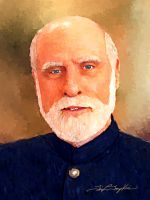Vinton Cerf Ph.D.
Vinton Cerf Ph.D.
National Medal of Technology and Innovation 1997
“Brilliant, indescribably enthusiastic, humorous, happy, treats people extremely well. It would be nice to go to work every day and work with people like Vint Cerf.” – R.V. Nagaveni, Founder, Ganga Library.
Biography
Books
CV, Extensive/Publications
Defining Moment/Regret
Family
Founder
Harassment
Health
History of Discovery – Brief History of the Internet
History of Discovery – History of the Internet Answers to Questions
Hobbies
Humor/Quotations
Images
Maverick/Youth
Patents
Personality
Thought Process
Videos
Humor
1. There are some people who imagine that older adults don’t know how to use the internet. My immediate reaction is, “I’ve got news for you, we invented it.
2. Programming computers was so fascinating. You create your own little universe, and then it does what you tell it to do.
3. What would happen if our clothes were Internet-enabled? Can you imagine if you lost a sock? You could send out a search, and sock No. 3117 would respond that it’s under the couch in the living room.
4. I used to tell jokes about Internet-enabled lightbulbs. I can’t tell jokes about it anymore – there already is an Internet-connected lightbulb.
5. Will we shoot virtually at each other over the Internet? Probably not. On the other hand, there may be wars fought about the Internet.
6. The net’s future is far from assured, and history offers much warning. Within a few decades of Gutenberg’s creation, princes and priests moved to restrict the right to print books.
7. Some people argue we should solve all the problems on Earth before going off the planet, but that’s like telling Lewis and Clark to stay put until the rest of the East was settled. No way.
Quotations
1. There is a project that’s underway called the interplanetary Internet. It’s in operation between Earth and Mars. It’s operating on the International Space Station. It’s part of the spacecraft that’s in orbit around the Sun that’s rendezvoused with two planets.
2. I think imaginative exercises can have a profound impact on the future – what you can imagine can sometimes turn into something you can figure out how to build.
3. In the earliest days, this was a project I worked on with great passion because I wanted to solve the Defense Department’s problem: it did not want proprietary networking and it didn’t want to be confined to a single network technology.
4. Information flow is what the Internet is about. Information sharing is power. If you don’t share your ideas, smart people can’t do anything about them, and you’ll remain anonymous and powerless.
5. Commercialization of assets off the planet would mutually reinforce the growth of interplanetary communication.
6. We all know the Internet didn’t explode until it became a commercial enterprise. Space communication will probably have the same characteristic.
7. At some point, you can’t lift this boulder with just your own strength. And if you find that you need to move bigger and bigger boulders up hills, you will need more and more help.
8. We had no idea that this would turn into a global and public infrastructure.
9. The remarkable social impact and economic success of the Internet is in many ways directly attributable to the architectural characteristics that were part of its design. The Internet was designed with no gatekeepers over new content or services.
10. Instant messaging and chat rooms have basically created a level playing field for deaf people.
11. Free is not going to go away. Either the advertising model will still work, or there will still be literally hundreds of millions of people who want to put their information on the Net and want people to have access to it.
12. In a small company, you often see a lot more of what goes on in a broader range of things. And that’s good.
13. Virtually any appliance is going to be online. Appliances will talk to each other and to the power-generation system. Our appliances will pay attention to our preferences.
14. In 1970, there was a single telephone company in the United States called AT&T, and its technology was called circuit switching, and that was all any telecom engineer worried about.
15. The more we can organize, find and manage information, the more effectively we can function in our modern world.

